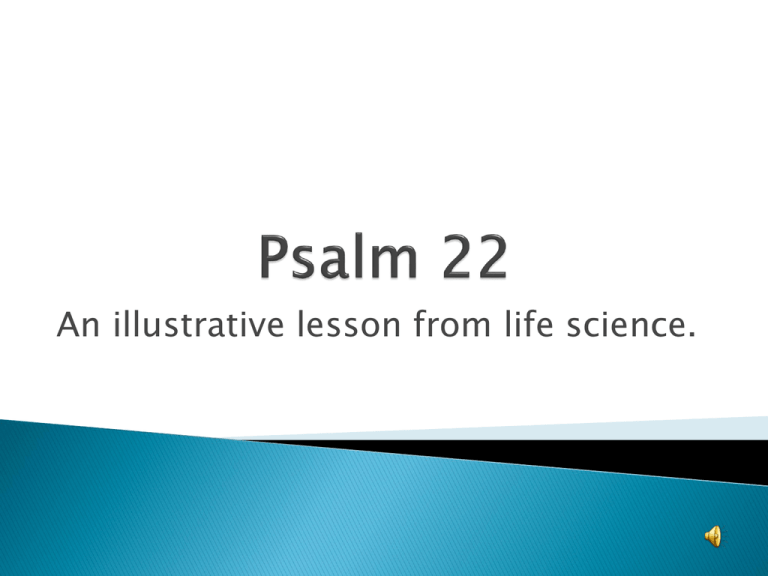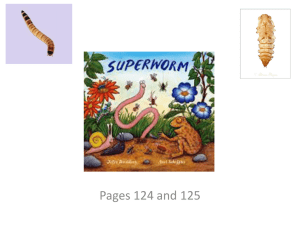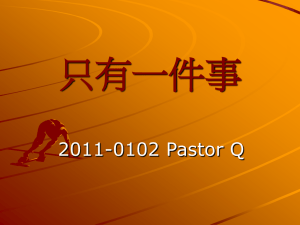Psalm 22 Presentation
advertisement

An illustrative lesson from life science. No other Psalm describes the crucifixion of Christ in such detail. Psalms were written about 1,000 years before Christ. Crucifixion was invented approximately 500 years prior to Christ’s death. Verse 1 My God, my God, why have you forsaken me? Why are you so far from saving me, so far from the words of my groaning? Matthew 27:46 About the ninth hour Jesus cried out in a loud voice, “Eloi, Eloi, lama sabachthani?” – which means, “My God, my God, why have you forsaken me?” Verses 6-8 But I am a worm and not a man, scorned by men and despised by the people. All who see me mock me; they hurl insults, shaking their heads: He trusts in the Lord; let the Lord rescue him. Let him deliver him, since he delights in him. Matthew 27:39-40 Those who passed by hurled insults at him, shaking their heads and saying, “You who are going to destroy the temple and build it up in three days, save yourself! Come down from the cross, if you are the Son of God. Mark 15:29-30 Those who passed by hurled insults at him, shaking their heads and saying, “So! You who are going to destroy the temple and build it in three days, come down from the cross and save yourself.” Matthew 27:43 He trusts in God. Let God rescue him now if he wants him, for he said, ‘I am the Son of God.’ Verses 14-15 I am poured out like water, and all my bones are out of joint. My heart has turned to wax; it has melted away within me. My strength is dried up like a potsherd, and my tongue sticks to the roof of my mouth; you lay me in the dust of death. John 19:28 Later, knowing that all was now completed, and so that Scripture would be fulfilled, Jesus said, “I am thirsty.” Verse 16 Dogs have surrounded me; a band of evil men has encircled me, they have pierced my hands and my feet. John 19:36-37 These things happened so that the scripture would be fulfilled: “Not one of his bones will be broken,” and, as another scripture says, “They will look on the one they have pierced.” Verses 17-18 I can count all my bones; people stare and gloat over me. They divide my garments among them and cast lots for my clothing. John 15:24 And they crucified him. Dividing up his clothes, they cast lots to see what each would get. This Psalm is regarded as a prophetic word of the crucifixion of Christ. Focus for today: Psalm 22:6 But I am a worm and not a man, scorned by men and despised by people. What thoughts does the word worm invoke? Depravity Decay Lowliness Ill Health When the Israelites were given instructions to only keep enough manna for each day we find the following: Exodus 16:20 However, some of them paid no attention to Moses; they kept part of it until morning, but it was full of maggots (worms) and began to smell, so Moses was angry with them. When God warned the Israelites about the consequences of disobedience he said, Exodus 28:29 You will plant vineyards and cultivate them but you will not drink wine or gather the grapes, because worms will eat them. Bildad the Shuhite told Job: Job 25:5-6 If even the moon is not bright and the stars are not pure in his eyes, how much less man, who is but a maggot – a son of man, who is only a worm! Isaiah 14:11 All your pomp has been brought down to the grave, along with the noise of your harps; maggots are spread out beneath you and worms cover you. Isaiah 41:14 Do not be afraid, O worm Jacob, O little Israel, for I myself will help you, declares the Lord, your Redeemer, the Holy One of Israel Isaiah 66:24 And they will go out and look upon the dead bodies of those who rebelled against me; their worm will not die, nor will their fire be quenched, and they will be loathsome to all mankind. Jonah 4:7 But at dawn the next day God provided a worm, which chewed the vine so that it withered. Psalm 22:6 But I am a worm and not a man, scorned by men and despised by the people. Why would Scripture refer to Christ as a worm? The word “worm” in the original Hebrew Towla / Tolah’ath / towla’ath 1) worm, scarlet stuff, crimson 1a) worm – the femal ‘coccus ilicis’ 1b1) the dye made from the dried body of the worm, “coccus ilicis” Coccus ilicis or scarlet worm is actually an insect. Isaiah 53:2 He had no beauty or majesty to attract us to him, nothing in his appearance that we should desire him. Life Cycle of the Coccus ilicis When it’s time to lay eggs, the insect crawls onto a tree. It does so willingly. Luke 22:42 Father, if you are willing, take this cup from me; yet not my will, but yours be done. Life Cycle of the Coccus ilicis It attaches itself willingly to the tree, even though this process will take its life. Matthew 26:53 Do you think I cannot call on my Father, and he will at once put at my disposal more than twelve legions of angels? Life Cycle of the Coccus ilicis During the birthing process, the insect secretes a crimson fluid or gel which stains the tree. Hebrews 9:14 How much more, then, will the blood of Christ, who through the eternal Spirit offered himself unblemished to God, cleanse our consciences from acts that lead to death, so that we may serve the living God! Revelation 1:5b To him who loves us and has freed us from our sins by his blood I Peter 1:18-19 For you know that it was not with perishable things such as silver or gold that you were redeemed from the empty way of life handed down to you from your forefathers, but with the precious blood of Christ, a lamb without blemish or defect. Life Cycle of the Coccus ilicis When the eggs are laid, the mother dies and the young feed on her body. John 6:51 I am the living bread that came down from heaven. If anyone eats of this bread, he will live forever. This bread is my flesh, which I will give for the life of the world. Life Cycle of the Coccus ilicis For 3 days this gel can be used to make dye. This is the same dye used in the tabernacle and garments of the High Priest. Definition of Towla 1b) scarlet stuff, crimson, scarlet 1b1) the dye made from the dried body of the female of the worm “coccus ilicis” The same word, towla, is used in verses in the Old Testament that say scarlet or crimson. Exodus 25-30 Instructions for tabernacle & priestly garments. Crimson / scarlet = towla Exodus 28:5 Have them use gold, and blue, purple and scarlet yarn, and fine linen. Life Cycle of the Coccus ilicis On the fourth day after death, the insect’s head and tail have come together to form a heart shape, and it has become like wax. Psalm 22:14b My heart has turned to wax; it has melted away within me. Life Cycle of the Coccus ilicis The wax is no longer crimson, but is now white. Isaiah 1:18 Come let us reason together, says the Lord, “Though your sins be as scarlet, they shall be as white as snow; though they are red as crimson, they shall be like wool.” Life Cycle of the Coccus ilicis The wax can be harvested and used to make shellac, a wood preservative / finish. Acts 2:31 Seeing what was ahead, he spoke of the resurrection of the Christ, that he was not abandoned to the grave, nor did his body see decay. When this insect is crushed, it is very fragrant. 2 Corinthians 2:14 But thanks be to God, who always leads us in triumphal procession in Christ and through us spreads everywhere the fragrance of the knowledge of him. This insect has also been used to make medicine. I Peter 2:24 He himself bore our sins in his body on the tree, so that we might die to sins and live for righteousness; by his wounds you have been healed. 2 Timothy 3:16 All Scripture is God-breathed and is useful for teaching, rebuking, correcting and training in righteousness Every word that is in Scripture is there for a reason. Will we dig deep enough to understand its meaning? www.templeinstitute.org/tola-at_shani.htm www.omegascripture.info/worthystudy/worm.ht ml www.blueletterbible.com www.insectman.us/articles/biblical/crimsonworm.htm http://onlinedictionary.datasegment.com/word/c occus+ilicis This is a list of resources I used in studying the coccus ilisis which also goes by the name kermes vermilio. www.blueletterbible.com (Look up Psalm 22 then scroll to verse 6. You can then use the C button to find the concordance and Hebrew / Greek lexicon to find the Strong’s Concordance records for each word in the text. You can also find all the other references in scripture that use the word towla.) www.templeinstitute.org/tola-at_shan.htm (There are other things on this site that I found fascinating. It is a Jewish webpage and the group is working towards rebuilding the temple.) www.omegascripture.info/worthystudy/worm.html www.insectman.us/articles/biblical/crimson-worm.htm http://onlinedictionary.datasegment.com/word/coccus+ilicis http://sourceryforge.org/index.php/Crimson (This is where I discovered that coccus ilicis and kermes vermilio were the same insect) www.azerbaijanrugs.com/arfp-natural_dyes_insect_cyes.htm (When on the Temple Institute site, I saw that they had ordered some of the insects from Turkey. If you scroll down on the Azerbaijanrugs site, you will find a 2) The Oak Kermes Insect (under the picture of this insect is says formerly coccus ilisis.) http://stainsfile.info/StainsFile/dyes/75460.htm On the omegescripture webpage, the author placed a picture of a grub that he claims is the coccus ilisis. After doing my research, I do not believe that he had the correct picture because the grub that he has on there, does not match the definition of coccus ilisis nor does it match any other pictures on the web of kermes vermilio which is coccus ilisis. However, the word study information that he gives is very good. He did claim that ilisis means “It is finished” in Latin, but I was not able to verify this information, which his why I did not include it in my presentation. When using an online translator and translating from English (It is finished) to Latin, I did not see ilicis there. I hope that you find this information useful.









